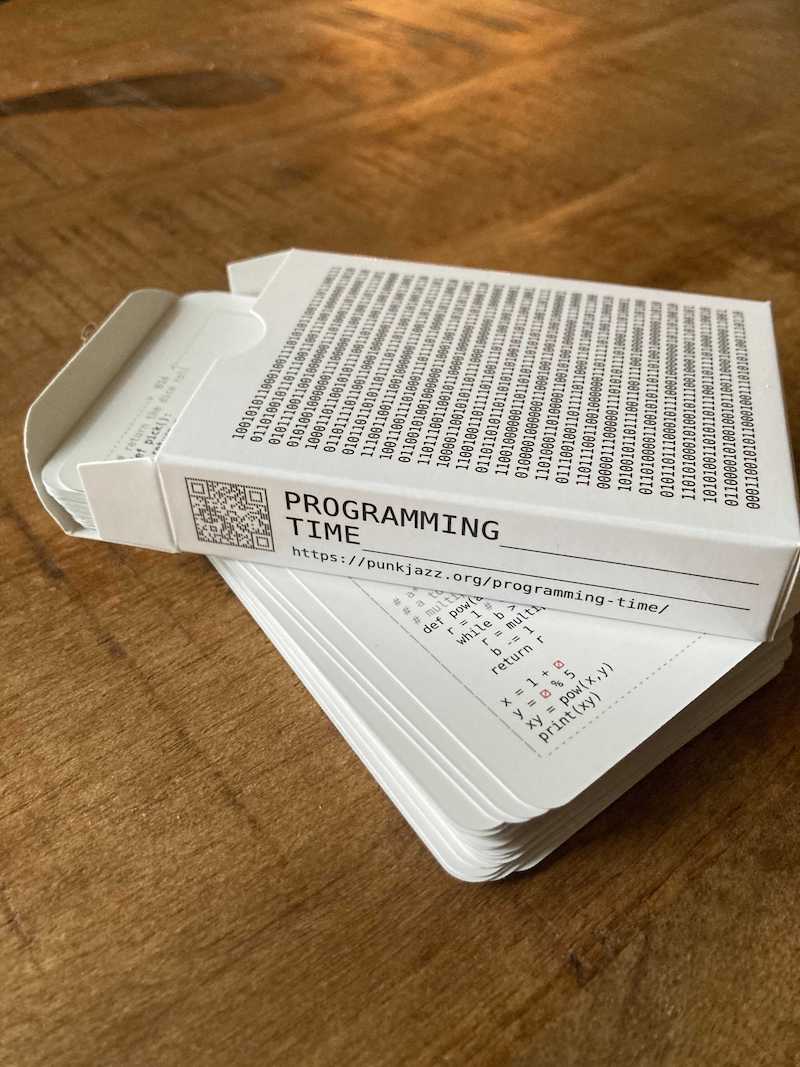 Programming Time, which is a game to teach python and some more fundamental algorithms, from hash tables to RSA
Programming Time, which is a game to teach python and some more fundamental algorithms, from hash tables to RSA
paste, tr, cut, bc as commands. cat, grep, tail, head, wc, sort, uniq, paste, tr, cut, bc. The parent should show also show those commands in action the computer as well, if you do not have any UNIX system you can use jslinux in your browser.

paste, tr, cut, bc work.paste to join those outputs with '/' and pipe it again into the calculator:

This game requires The UNIX Pipes Game
version 0, you can get it at:
https://punkx.org/unix-pipe-game/
It contains sort, cat and other commands
needed in order to solve the tasks in
this game expansion.
The rules are the same:
> 1. The youngest players picks a task
from the tasks card. You can not pick
the same task twice.
> 2. Shuffle the cards from both decks.
> 3. Put the cards face down on the
table.
> 4. Going clockwise each player picks
the top card from the deck and try to
complete the task
> 5. The first player who completes the
task gets a point.
> 6. IF there are no more tasks, GOTO 8
> 7. GOTO 1.
> 8. GAME OVER. INSERT COIN. GOTO 8
TASKS
* swap the rating and title column
* print the last row's votes
* remove the Rank and Votes column
* print only the title column
uppercased
* print the first and the last movie
* print the votes difference between
the top and bottom voted movie
* sum the votes
* sum the votes of movies from 2016
* show the best ranked title, only
title, no other columns
* replace commas with tabs, remove spaces
* print the titles but as a giant
string: Sing Interstellar ...
* compute the average rating
sum(rating)/(amount of movies)
If you are a parent teaching your kid, and is exploring more tools to help you, I made few other card games:
 Programming Time, which is a game to teach python and some more fundamental algorithms, from hash tables to RSA
Programming Time, which is a game to teach python and some more fundamental algorithms, from hash tables to RSA
 The C Pointer Game - Pointers, Arrays and Strings, a game to teach kids to look at the computer memory and understand references and values
The C Pointer Game - Pointers, Arrays and Strings, a game to teach kids to look at the computer memory and understand references and values
 4917, a game to teach kids machine code and how the CPU works with memory and registers
4917, a game to teach kids machine code and how the CPU works with memory and registers
 The Unix Pipes Game, a game to teach kids to use basic UNIX commands:
The Unix Pipes Game, a game to teach kids to use basic UNIX commands: cat, sort, grep, head, tail, wc, uniq
 RunLength Encoding for Kids, small cards "game" to explain runlength encoding
RunLength Encoding for Kids, small cards "game" to explain runlength encoding
 PUNK0 - The Function Composition Card Game, use cards to manipulate a list and use its values to win the game
PUNK0 - The Function Composition Card Game, use cards to manipulate a list and use its values to win the game
PROJEKT: OVERFLOW, RISCV assembler boardgame
 Programming for kids, a log of my journey of teaching my daughter how to code
Programming for kids, a log of my journey of teaching my daughter how to code